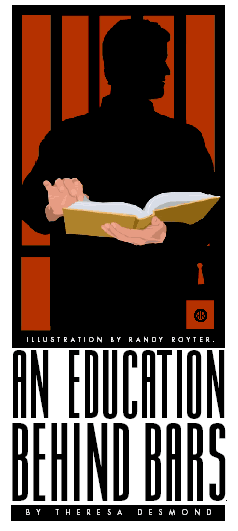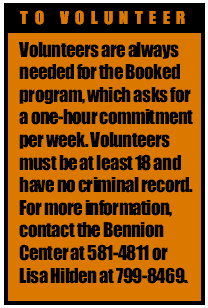| Vol.
13. No. 1 |
Summer
2003 |
| PAIRING STUDENTS
WITH PRISONERS, THE "BOOKED" PROGRAM AIMS TO REDUCE JAILHOUSE
ILLITERACY
|
 When
Angela Bagley Foote’s BS’90 Salt Lake City home was burglarized
in 1994, it wasn’t a simple grab-and-go job.
When
Angela Bagley Foote’s BS’90 Salt Lake City home was burglarized
in 1994, it wasn’t a simple grab-and-go job.
“It looked like a hurricane had gone through,” she remembers. “They stole so many things and just ripped the place up.”
Foote experienced the usual victim’s reactions—“I felt angry, helpless, like my world was out of control”—but with one difference. Though she harbored fantasies of going after the perpetrators, vigilante-style, she decided instead to turn the experience around by doing something positive.
That’s where the “Booked” program came in.
“I read about this program in the newspaper,” she recalls. “It said that people who commit crimes often don’t have basic literacy skills. But if they are able to participate in an educational program, they’re less likely to return to crime.” Foote, a communication graduate, decided to put her skills to use for both social and personal reasons. “I wanted to keep this from happening to others and to me again,” she says. “And I thought participating might make my whole experience less traumatic; it would help me cope.”
So, for about a year, Foote volunteered for Booked, a program begun in 1992 by Third District Judge Leslie Lewis JD’74 to bring reading, writing, math, job, and coping skills to prisoners at the Salt Lake County Metropolitan Jail. Once a week, volunteers meet with prisoners for one-on-one tutoring or group classes. “About 79 percent of all inmates are functionally illiterate,” says Lewis. “If people don’t have any education or the capacity to earn a living, they don’t have many options, and we will see them back in the system.”
For the last couple of years, the U’s Bennion Community Service Center has partnered with Booked, coordinating student volunteers to participate in the program. About 20 to 30 students are available to work with prisoners, with about 10 actively volunteering in any given semester. “The program has had a profound effect on students,” says Marshall Welch ex’85, director of the Bennion Center. “It offers them a new and different insight into a segment of the population they don’t usually see, and opens their eyes to what brings people into the judicial system. I think they find that the inmates are more like us than different from us.”
Foote, who participated in the Booked program when it was in its infancy, worked with different prisoners on their specific needs. Some, for example, had not finished high school, while another, with a high school degree, “could barely read.” Foote brought in reading materials that she thought would be of interest to the inmate—such as articles on the Dallas Cowboys, his favorite team—and that would help him after his release, including a construction trade manual. All of the prisoners, she says, were “very respectful, very nice—and very grateful.”
Troy Finlayson and Mark Pulver, student leaders of the Bennion Center’s inmate services, say their volunteer experiences have also been quite positive—with one exception. Pulver, a pre-med senior, remembers his first time at the jail as a less-than auspicious start. “I was nervous,” he says, recalling the banging doors and shouting guards that greeted him. “The guards brought in the prisoner, who was wearing handcuffs, through one door, and I came in another door. But the prisoner wouldn’t talk to me at first. Then he just gave one-word answers. So after a while, they led him out. And while the door was open, another prisoner walked by and said, ‘**** you, college boy.’”
 Undaunted,
Pulver came back the next week. “I could tell that this guy I was
supposed to be working with wanted help, deep down. You could just sense
it,” he says. “And he did. After a few weeks, he softened
up. When he left our last session, he gave me a hug and got kind of teary-eyed.”
Undaunted,
Pulver came back the next week. “I could tell that this guy I was
supposed to be working with wanted help, deep down. You could just sense
it,” he says. “And he did. After a few weeks, he softened
up. When he left our last session, he gave me a hug and got kind of teary-eyed.”
Pulver and Finlayson teach a weekly “life skills” class, working with prisoners on budgeting money, applying for jobs, writing résumés, setting goals, and managing anger. “Hearing [the prisoners] vocalize their desire never to be back, hearing what their goals are, and seeing that they do care makes you understand that what you say really matters,” says Finlayson. “That’s what motivates you. And as soon as they get to know you, they’re relaxed and so grateful that you’re doing this.”
Pulver agrees. “The prisoners are really respectful, and very smart. There is a lot of good inside of them.”
Booked’s coordinator, Lisa Hilden BA’98, says that many prisoners want to complete their high school degree— “Usually, they’re at about a ninth grade level,” she says—and improve their social skills. The volunteers, most of whom are either University students or retirees, are important as both teachers and role models. “Showing up is a big part of it,” she says. “The prisoners see that commitment, and it means something to them.”
The jail is a maximum-security facility, and volunteers work with all classifications of prisoners. Because the jail houses those with less than a year’s sentence, the population is transient, Hilden says, so the tutoring needs vary. “We ask for a three-month commitment from both prisoner and tutor. The prisoners want help in all areas, from getting a high school diploma to substance abuse counseling.”
In 2002, the Booked program counted nearly 6,000 volunteer hours, and 28 prisoners graduated from high school. Twenty have already graduated in 2003.
“These prisoners are going to be back out on the street someday,” Hilden points out, “so it’s better if they’re employable and have improved life skills. That helps to reduce the recidivism rate”—a claim that has been validated by multi-state studies. Still, not all correctional facilities offer educational programs, and at many, like the county jail, participation is optional. “We have a captive audience,” points out Lewis. “Why ask them to watch TV if they can get an education? And they want it.”
Often, the educational experience is as much the tutor’s as the prisoner’s. “I remember one inmate who had taken the MCAT [Medical College Admission Test] and was preparing for med school,” says Finlayson, who, like Pulver, is pre-med. “He hurt his back in an accident, got addicted to painkillers, and then was arrested on a drug charge. Most people are in jail because of bad choices.”
Foote, too, says the program helped both her and the prisoners. “It felt good to address my situation in a constructive way,” she says. “The inmates really wanted to change, and literacy is essential to making that happen.”
—Theresa Desmond is editor of Continuum.
